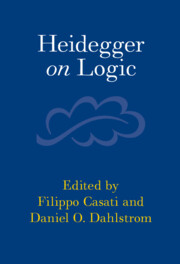Book contents
- Heidegger on Logic
- Heidegger on Logic
- Copyright page
- Contents
- Contributors
- Acknowledgments
- Method of Citation
- Introduction
- Part I Normativity, the Phenomenology of Assertions, and Productive Logic
- Chapter 1 Heidegger’s Phenomenology and the Normativity of Logic
- Chapter 2 Heidegger on the Changeover in Assertions
- Chapter 3 Heidegger’s Productive Logic
- Part II Language, Logic, and Nonsense
- Part III Paradox, the Prospects for Ontology, and Beyond
- Part IV Logical Principles and the Question of Being
- References
- Index
Chapter 1 - Heidegger’s Phenomenology and the Normativity of Logic
from Part I - Normativity, the Phenomenology of Assertions, and Productive Logic
Published online by Cambridge University Press: 15 September 2022
- Heidegger on Logic
- Heidegger on Logic
- Copyright page
- Contents
- Contributors
- Acknowledgments
- Method of Citation
- Introduction
- Part I Normativity, the Phenomenology of Assertions, and Productive Logic
- Chapter 1 Heidegger’s Phenomenology and the Normativity of Logic
- Chapter 2 Heidegger on the Changeover in Assertions
- Chapter 3 Heidegger’s Productive Logic
- Part II Language, Logic, and Nonsense
- Part III Paradox, the Prospects for Ontology, and Beyond
- Part IV Logical Principles and the Question of Being
- References
- Index
Summary
Is logic intrinsically normative? Given that we often make errors in reasoning, one might hold that logic is not about how we do think but about how we ought to think. However, logical laws say nothing about thinking. How does logic gain normative traction on psychological processes such as belief formation or reasoning? To answer this question, the chapter begins by examining the debate between descriptivists, who hold that logic simply describes truth-preserving entailment relations, and normativists, who hold that logic is intrinsically normative. Husserl was a descriptivist, and Heidegger’s early work follows him. But Heidegger’s phenomenological account of the truth-predicate as grounded in the comportment of assertion, and his analysis of the “hermeneutic as” that grounds such comportment, affords a different perspective on the debate. Logic provides constitutive norms for the practice of reason-giving, a kind of rationality – being answerable to others – that is not an essential property of, but is nevertheless demanded by, Dasein’s being as “care.” The chapter concludes by showing how Heidegger’s phenomenological approach can affirm the main claims of descriptivism while insisting that “the reign of logic” in philosophy “disintegrates into the turbulence of a more original questioning.”
Keywords
Information
- Type
- Chapter
- Information
- Heidegger on Logic , pp. 13 - 33Publisher: Cambridge University PressPrint publication year: 2022
